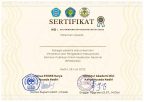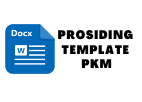APPLICATION OF EFFECTIVE COUGH TRAINING IN NURSING PROBLEMS INEFFECTIVE AIRBORNE CLEANING WITH PNEUMONIA AT INAHO KAI HOSPITAL JAPAN
Keywords:
Pneumonia, ineffective airway clearance, effective coughAbstract
Pneumonia is an acute lower respiratory tract infection with symptoms of cough accompanied by shortness of breath caused by infectious agents such as viruses, bacteria, mycoplasma (fungi), and aspiration of foreign substances, in the form of inflammation of the lungs accompanied by exudation and consolidation. This study aims to describe appropriate nursing care and interventions for Mrs. I with pneumonia whose primary diagnosis is ineffective airway clearance. This research uses the case study method with a case study of nursing care which includes assessment, determining diagnosis, determining nursing interventions, implementation and evaluation. The participants in this research were Mrs. I with problems with ineffective airway clearance. Providing effective cough training interventions carried out within a period of 3 x 24 hours was able to reduce shortness of breath and cough effectively. Evaluation of the results was carried out over 3 x 24 hours, it was found that ineffective airway clearance was resolved with the criteria of effective cough being quite increased, oxygen saturation was increasing, sputum production was quite decreased, dyspnea was quite improved, respiratory frequency was quite improved, and breath sounds were quite improved. Non-pharmacological therapy, namely coughing exercises, can help improve airway clearance and is not effective when combined with other pharmacological therapies.
Downloads
Published
Issue
Section
License
Copyright (c) 2025 Proceedings of the National Health Scientific Publication Seminar

This work is licensed under a Creative Commons Attribution 4.0 International License.







